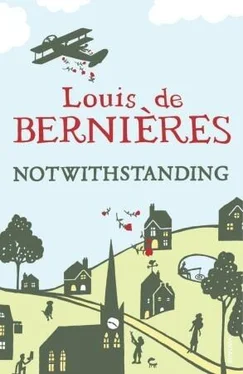There ensued many days of energetic and creative activity on the part of the entire household. Her brother John was dispatched to the slaughterhouse to fetch back the head of a cow. It was boiled to remove the flesh, which was soon eaten at dinner, and then he set about sawing off the crown. He bound the tips of the horns thickly with sackcloth, and soaked them in pitch. Setting off early one morning, mother and sister went all the way to Godalming on a cart to find bolts of red cloth. Mr Maunderfield rode down to Malthouse Lane on his cob to select a good site, and was fortunate to find an oak stump at the side of the road that was four feet high. At the back of it he cut toeholds with an axe. Bessie herself shredded paper and cloth into a pail, and mixed it all up with glue. She made a former out of clay, allowed it to dry, smeared it with butter, and then carefully coated it to the depth of her little fingernail with the mess from the pail. When it was dry she painted it red and lifted it off the mould. Mr Maunderfield stood in the kitchen and practised his speech, in the deepest voice he could muster. He sang bass in the church choir, and therefore began with a considerable advantage.
On the designated night, Piers de Mandeville, half asleep, his tongue stinging and bitter from cheap tobacco, stupid with alcohol, and as much drunk with despair as spirits, hacked slowly home on his mare. There was a half-moon, but it was dark beneath the overhanging trees, and the night was cold but quite still. Wisps of black cloud passed slowly across the face of the moon, casting gossamer shadows. Foxes coughed in the woods, and owls screeched or hooted according to their kind. When Piers de Mandeville passed the crossroad at Lane End, where once they used to bury the suicides, Bessie’s brother John, hidden behind the hedge, put his hands together and blew into the cavity they formed. Three long identical hoots were the signal. Quietly he slipped through the hedge, and followed Piers de Mandeville at a small distance. At the spot where in the distant future would stand the half-tiled house inhabited by the naked general and his rhododendrons, Mr Maunderfield opened his tinderbox and repeatedly struck the flint. Once the tinder was smouldering, he handed the box to his wife, and carefully mounted the stump, feeling for the axe notches with his feet. He then released the cord binding up his robes and let the drapes of cloth fall down around the stump. When Piers de Mandeville was barely twenty yards from him he bent down and whispered, ‘Now!’
With a lit spill caught in the cleft of a long stick, Bessie’s mother ignited the pitch-soaked rags, and Mr Maunderfield stood erect and roared.
So startled was de Mandeville’s horse, that she leapt sideways and then reared. De Mandeville, too drunk even to have managed to get his feet into the stirrups, slipped backwards off her hindquarters and landed in the muddy road on his rump. The mare bolted ahead, whinnying, and de Mandeville scrambled to his feet.
He beheld a most terrible apparition. Ten feet tall, robed in red, stood a vast creature. It had a huge and hideous red face, with large blank eyes, and above its head rose curved horns that flared at the tips, the flames casting violent shadows as the figure waved its arms and nodded its head.
‘Piers de Mandeville, of Notwithstanding Manor in the county of Surrey, Esquire,’ announced the creature, which had a strong local accent that Piers was too drunk to find peculiar.
He gazed at it, wordless with horror, clutching his hat in his hand.
‘How pleased we are, how very pleased we all are, that you have generously yielded up your soul. How very pleased we are that within such a short time we shall be relishing your company in Outer Darkness, where there is weeping and wailing, and gnashing of teeth.’
De Mandeville fell to his knees. ‘I beg you,’ he began, but was unable to continue. He started to whimper with terror, but could not take his eyes off the figure of the Devil.
‘You shall be ours on the night the child is born, you shall be ours, you shall be ours on that fatal night. Is that not so, my brothers and sisters?’
From behind, in the trees, came laughter and shrieking, and whooping, and the dinning of wooden spoons on copper pans.
The Devil held up his arms for silence, and asked in his booming voice, ‘What do you plead to that, Piers de Mandeville?’
‘Spare me,’ said the young man, simply, ‘spare me.’
‘That was the bargain. Do you deny it?’
‘Only if I do not marry,’ said de Mandeville weakly.
The Devil hissed, ‘No, no, you must not marry. No, no, marry not.’
From the trees behind came howls of rage and disappointment. First one flame on the horn extinguished itself, and then the other. To be alone in the dark with a Satan that he could not see was too much for Piers de Mandeville. He crawled a short way, then struggled to his feet and ran, bent double as if to avoid blows, scarcely able to run in a straight line, scarcely able to run at all. Laughter followed him up Malthouse Hill, and a deer ran out across the road in front of him, adding startlement to his fear.
Three days later in the evening Piers de Mandeville arrived on horseback before the Maunder-fields’ cottage. He dismounted and began to tie his horse to the ring set in the wall. Bessie, by now heavily pregnant, saw him from the window and came out.
‘Oh sir, you do look terrible awful,’ she said. He did indeed look very bad. He was pale and wild-eyed, and seemed to have become wasted and thin almost overnight. He did, however, have a mature air of purpose about him.
‘Bessie,’ he said, ‘I have come to tell you that we shall do what we should have done a very long time ago. I have been a most shameful coward. We shall be married in St Mary’s as soon as the banns are read. My father is resigned to it, and my mother is saying nothing further against it. They ask only that I marry in your parish rather than theirs, and that they should not be expected at the wedding. We are fortunate indeed that I am not the first son. If I had been my brother, God knows what would have happened.’
‘Come in and meet my father, sir,’ said Bessie mischievously. ‘I believe you first have to ask him if he is willing to give me up. I fear you might have to overcome his reluctance.’
‘Ah, Bessie, there is plenty of time for that. All I want for now is to take a walk with you on my arm, and confer about what we shall do. I imagine you are sufficiently well to walk?’
‘Well, sir, it’s only fine ladies who take to their beds when a tiddler’s on the way. The rest of us just carry on as needs must.’
They walked slowly through the Hurst, with her arm through his for support. Piers raised his hat to those they passed, ignoring their astonished expressions. As they drew near the pond, Bessie said, ‘Shall we go into the woods? We can find our special place.’
Piers de Mandeville laid his cape on the ground and they sat side by side by the stream, just as they had so many months before. For a little while they were silent, and then Bessie asked slyly, ‘What was it that made up your mind, sir?’
‘Well, Bessie, have you heard the story of Saul on the road to Damascus?’
‘Yes, sir, I have heard it.’
‘It was something very like to that.’
‘Indeed, sir? And is Emily Sutton very downcast?’
‘I presume to hope that she might be, but not for too long, I trust.’
‘And what about your other promise, sir? The other promise you made in this same place?’
Piers de Mandeville laughed quietly, and looked at her askance. ‘I believe, madam, that you wanted me to call you madam, did you not, madam?’
‘I did indeed, sir, but don’t go overdoing it, sir.’
Читать дальше












